#vanillablessing
Text
Why you should check out Persia, the Magic Fairy, a Magical Girl You’ve Never Heard Of
In the early 80’s, Studio Pierrot (now known for all the naruto) decided the magical girl genre needed more entries that were both bland and extremely long, which resulted in Creamy Mami (1983), Persia, the Magic Fairy (1984), Magical Emi, the Magic Star (1985), Pastel Yumi (1986), and Fancy Lala (1986), along with several very strange crossovers episodes. That’s Persia with the blue hair. No, not that one, I mean the one on the bottom left.
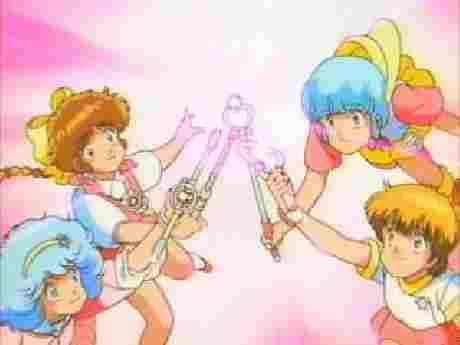
They’re all kind of terrible for various reasons, but of them, Persia is the least outright offensive and probably the only one you should consider watching, even if it shows its age in a couple ways. I’m not going to go into exactly why the other Pierrot magical girl series aren’t good, but from my experience I’d rank them Persia>Emi=Mami=Lala>Yumi. Pastel Yumi is outright awful, and the other ones range from uninteresting to slightly creepy. Fancy Lala has a bizarre spinoff movie called Fashion Lala which turns into some sort of more violent Footloose? I don’t know if that one counts.

Persia is an 11-year old girl who was raised by lions in Africa along with her brother, named Simba, who’s obviously a lion. She ends up in the magical Lovely Dream while on an international flight to Japan and is tasked with saving all dreams with a magic headband and baton she can use to turn older or younger and there are three kappa that tell her to do things and it doesn’t really matter and the show doesn’t take it too seriously either. Simba comes to live with her but because he’s a fully grown lion she uses magic to shrink him to mascot size. There are also some teenagers she hangs around with because I don’t think anyone at Pierrot was actually willing to write more than one kid into these anime, but notably unlike the other Pierrot magical girl series Persia’s not crushing on either of the guys, and they’re much too busy trying to get with other teenagers.
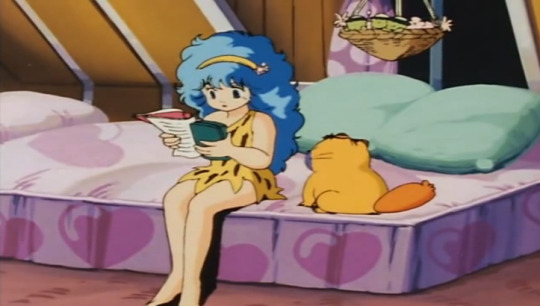
Persia reading a handheld personal computer manual
From the scant subbed episodes of Persia that haven’t been lost, I get the impression that Persia is more comedic than the other series. This works well with the dated look and content of the show, since it (mostly) comes off as nostalgic and quaint instead of backwards and embarrassing. Persia as a magical girl is fun-loving, independent, strong, and learns contemporary things quickly, especially for being literally raised by lions on the Serengenti.
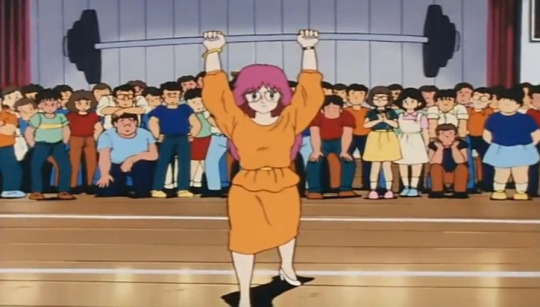
Persia strong
In the few episodes that are translated, there are a few wild ideas by magical girl standards like episode 5, which focuses on a pair of female wrestlers named Oscar and Andre, and gets ridiculously close to having them kiss before one of them suddenly gets married offscreen because it’s the 80s in Japan. There’s a couple of these blemishes on Persia, the Magic Fairy which are probably more endemic of Japanese values at the time, but generally it’s a cute, inoffensive show with low stakes and silly faces.
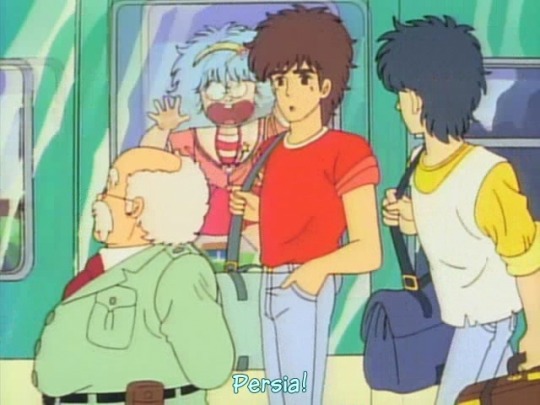
Persia runs into a train door and her face gets stuck like this for a full minute
At the moment, English subs are hard to find for the show so you’ll have to use more nefarious means to watch them, or just click this youtube playlist which nobody has ever bothered to flag, https://www.youtube.com/playlist?list=PLco2EJsto8t66anOmmrRtPQubAuIyPlDh. Unfortunately I haven’t been able to find subs past episode 8 myself, but I hope one day these totally legal torrents of the raw sub files will catch something. Of the generally bad Pierrot magical girls, it’s the only one I give half a flip about, and the only one I’d recommend if you wanted to experience the least unwatchable show from a very boring period of magical girl history.
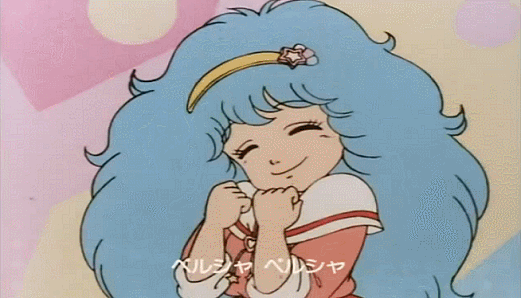
- only qb queuebae on twitter would write this
#persia the magic fairy#vanillablessing#blessing of vanilla#blue hair#gotta have blue hair#her brothers a lion thats wacky
4 notes
·
View notes
Text
Subtext is for Cowards - Revue Starlight
I watched a lot of musicals and plays as a kid. I was dragged to most of them, but I had fun usually, although in retrospect I lacked things such as the cultural context, vocabulary, and attention span needed to fully appreciate them. Revue Starlight, which is absolutely my favorite anime of 2018, deliberately replicates the magic of watching a live performance, with blinding spotlights in dark rooms, stylish battles inspired by stage mechanisms, and loud musical segments called revues. However, there's one major difference I personally noticed between watching Revue Starlight and how I remembered plays and musicals from my childhood; my time during Mamma Mia! or King Lear was mostly spent struggling to follow the plot, then bothering my parents to explain it at intermission, while Revue Starlight's central thread is crystal clear to audiences of all ages.
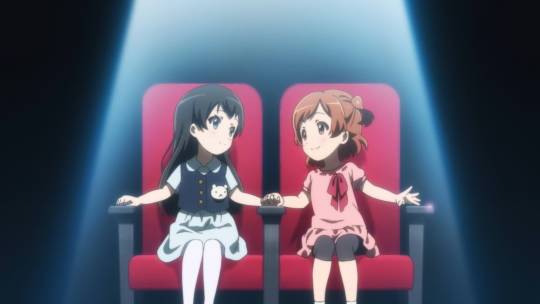
Revue Starlight is mysterious from the outset, as normal drama student Karen suddenly falls into an impossibly large underground fighting ring refereed by a talking giraffe, with little plot to hang on to. However, as the show reveals more, in becomes clear that every aspect from the opening lines of each episode, to the setup of every shot, to the tiny pink dot that's omnipresent in every frame of the anime, is hyper-focused on Starlight, the fictional play that serves as the centerpiece of the series, and by extension theater itself. Starlight is the shared obsession of all the named characters, and elements from it are repeated obsessively by the creators in all aspects of the show. Throughout the series, there is an absurd amount of repetition of lines (Pluck a small star, obtain a small happiness), significant names (Hikari meaning light), and grand visuals (Tokyo Tower, famous for lighting up at night), but everything can be tied back to the base ingredients of Starlight. Stars, towers, lights, and girls with tragic fates invade every aspect of the anime's production, mirroring the in-universe plot of the book and the play. It's a bombardment of symbolism and metaphor straightforwardly reinforcing the same elements, even before getting into the lyrics for the revues themselves, which serve to beat you over the head even further. To some people, this lack of hidden complexity is what prevents Revue Starlight from being a stronger narrative. However, I personally love that it wears its heart on its sleeve, and presents its meaning so obviously that even immature audiences would easily be able to understand.

In a way, Revue Starlight's constant emphasis on repeating and refining its themes resembles a season of PreCure. The monster-of-the-week formula is made fun of for an assumed lack of creativity, but PreCure's directors and producers, especially in the last few years, have utilized these weekly conflicts to emphasize repetition of themes and ideals over simply winning a fight, and eventually deliver on an emotional build-up that feels earned.

Rather than ascribing a moral as an afterthought to the cool battle, the moral itself is the conflict, unlike the trail of bodies left from Naruto's weird ninja eyeball conspiracies, or the win loss records of most martial arts sports anime. My Hero Academia, a very good x-men ripoff created by noted PreCure fan Kohei Horikoshi, is an example of a shonen that places more importance on the clashing of ideals and moral victories, instead of endless matchups of strong men due to familial revenge. Revue Starlight and PreCure both use their weekly spot to have a staged performance with a clear message, and they utilize the monster-of-the-week formula, or the audition process, to serially reinforce that core message.
Translated interview with several producers and writers on recent precure seasons: source and translation deem939 on twitter
Although I also adore nearly inscrutable metaphorical fever dreams, I find the clarity of Revue Starlight’s blatant symbolism refreshing. Too many times in a certain genre of anime, relationships are left unclear or unsaid, and arguments between friends become more inevitable than usual over the creators’ intention. Although Starlight’s plot is simplistic, it would be wrong to call it unrefined or underdeveloped. Revue Starlight replicates that magical experience of watching a play, but shoots for even more. It cloaks itself in its frankly obsessive commitment to all things theater and wears it boldly, like a badge of pride. It aims to match the idealized version of a performance, the version in your head that no recording could recreate. Although actual theater can be a little confusing for some members of the audience to follow, Revue Starlight does its best to leave no room for questions, in a way that absolutely everyone should be able to understand.
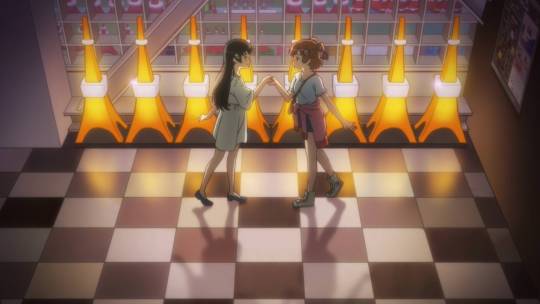

- qb queuebae on twitter friend of the magical girl senior mascot certified reporter on the field of the show
12 notes
·
View notes
Text
Twin Angel BREAK - Acceptance through Sheer Laziness
Twin Angel BREAK is a magical girl sequel to a sequel to a OVA based on a slot machine and it has a history of being kinda ecchi. It's not above sexualized magical girl transformations, using panty shots unironically in the year of our lord 2011, and could not be expected to be more accepting of homosexuality than any other lowest common denominator skeevy show for otaku. Against all odds, Twin Angel BREAK hasn't fulfilled this prophecy yet, and never quite crosses the line to gross, possibly from a lack of effort?
One of the ancillary classmates of the Twin Angel(s) is a blonde with long hair who introduces himself as a male, even though he dresses as a girl. He's accepted as one of the girls in the regular group of friends and even participates in gym class with the girls, but as a whole his character is exactly the same as how a normal girl classmate would be written with next to zero difference. The latest episode of Twin Angel BREAK even sets him up with another guy, but rather than abuse that situation for comedy or fanservice they just support him and leave it at that. Taking the easy way out because writing a girl is easier isn't exactly laudable, but its inadvertent acceptance of sexuality from sheer laziness represents, at the very least, a faceplant in the right direction.

(it’s a metaphor)
Unlike PriPara which pushes barriers, Twin Angel BREAK pretty much has no ambition at all. It looks generally good, and it's surprisingly inoffensive given the franchise's history as a grungy slot machine to rob big nerds, but as a whole it's a formulaic magical girl-meets-girl anime save some references and plot ties to old bad things from 2011. We shouldn’t give breaks to these kinds of lazy anime as far as evaluating their worth in the same way that we shouldn’t give ambitious but different shows undeserved bias just for being outside the norm, but that normal baseline of lowest common denominator anime can be useful to observe. Something like this can show a shift in the status quo, which can inform a more complete view of changes in the creative zeitgeist than wild outliers like PriPara. Not to mention the bar for gay representation in anime is so low that Twin Angel BREAK has basically cleared it by crawling.

By making a character who's essentially female, while mentioning in a throwaway line that he's male, Twin Angel BREAK evokes a lot of famous ecchi tropes with the potential to go to real bad places, based solely on what japan usually does when male crossdressers are involved, but by doing the bare minimum they've skirted that line and barely avoided it. Twin Angel BREAK actually takes care to not make fun of Yuki because of his dressing habits or interest in men and so far nobody has stood in his way or thinks it’s at all abnormal. The most it's ever acknowledged is Meguru's reaction after Yuki introduces himself, saying "well that's Tokyo for you" and never bringing it up again. He can be superficially compared to Leona from PriPara, but so far Twin Angel BREAK shows no indication that it is in any way interested in exploring his potential struggle with gender identity or, really, developing his personality at all beyond liking girl things and hanging out with girls and that's fine I guess. It is lazy to completely sidestep these potential character aspects and write him as a girly girl, but they've similarly not followed through with the potential for "trap comedy" which a grody ecchi series would usually jump at. It strikes a middle ground of doing barely anything with the character while also staying in line with Yuki's sparse character attributes of being very feminine, romantic, and enthusiastic.

(despite how this looks he means it in the other way)
Episode 4 of Twin Angel BREAK spends well over half its runtime establishing Tanaka Shori, or Billy, as a real piece of work, hopeless with romance and girls science-type jerkwad. After infiltrating the Twin Angel(s)' middle school to passively hit on girls, whatever that means, he analyzes the Twin Angel'(s) battle tactics using differential equations and determines that Angel Rose and Angel Sapphire are Yuki and Koromi (wrong) and sends Yuki a letter of challenge that gets found by Meguru and Miruku, misinterpreted, and rewritten as a love letter because of course that happens. Yuki, because he's a girly romantic, is smitten by the letter and shows up to the challenge in a white dress and excitedly embraces Billy and agrees to go out with him while Billy experiences sensory overload and forgets his mission. The Twin Angel(s) watch from behind a bush and the only commentary they have to add is how hot and heavy they're being at school. Yuki's relationship being guy-on-guy isn't played for laughs beyond Billy being an awkward and probably older man, and continuing from before, nobody so much as lifts an eyebrow as they accept them as a new couple. Billy gets fired from the villains' cabal for not doing his job and is thrown down a trapdoor. It's definitely still possible that they reverse this and play the relationship for laughs at Yuki's expense due to his gender, or kill Billy off like they did with John Garabushi, or cross the line into "traps" because that's what this caliber of show is bound to do. However, knowing how Twin Angel BREAK has been like so far, they'll likely never speak of this again, except when Yuki brags about his new boyfriend in class, to which the girls will say "Oh, that's cool," then move on to something else.

Twin Angel BREAK isn’t breaking any barriers here, but even if they're taking the easy way out, it’s a step forward for anime in general that even in a reboot of a reboot of an adaptation of a slot machine a guy who likes guys isn't automatically fodder for comedy and gets genuine support from his friends. However, it feels like an unfinished joke, but not in the same way as Komugi-chan R which was so far gone it needed to be rebuilt completely. The show sets up common tropes that would have been a sure sign of possibly homophobic jokes a decade ago, but then trails off and lets them exist without being a punchline. In a way, this tendency of Twin Angel BREAK is reflected in almost every part of the show; it's halfway to an ecchi, feels like an ecchi, but never really crosses that borderline. That said, I can appreciate that Twin Angel BREAK doesn't think that gay people should be punchlines, even if the delivery isn’t the best.
- magical girl historian qb (@queuebae)
Twin Angel BREAK (Twin Angels BREAK) is available subtitled in English on Crunchyroll.
#vanillablessing#twinangelbreak#twin angel break#ambivalent representation#baa#victorybilly#twin angel#twin angels break#PriPara
4 notes
·
View notes
Text
qb’s Mid-Season Reviews (Spring 2017)
Now that we’re at the halfway point for the season, I wrote some blurbs on my favorite and least favorite shows from the Spring 2017 season that I’ve watched so far. They’re loosely ranked by how much I’d recommend each anime, and go over the apparent strengths and weaknesses of each one. My favorites are the mostly the same as I speculated from the start of the season, but some of them didn’t turn out so great. These are what I’d say are easy recommendations:
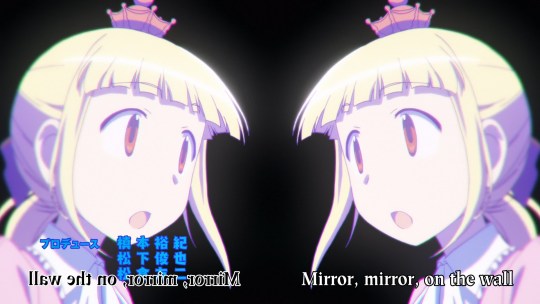
Alice & Zoroku
weaknesses - Alice & Zoroku has a tendency to be slightly maudlin, prone to a few tonal swings, and its necessary double-length first episode can be an obstacle. Additionally, it’s on the darker side of magical girls, and although it isn't defined by violence, it doesn't hold back in portrayals of cruelty, even when it probably should.
strengths - It pulls off a Nanoha-style combination of sci-fi and magical girls, and successfully balances high emotional peaks. Sana discovering the world and integrating into Zoroku's family in turn raises the stakes for the magical battles which threaten her new family. Zoroku the grumpy florist is a straight-up boss, and his role in the story as a grounded role model is both innovative and a perfect fit for this style of magical girl anime.
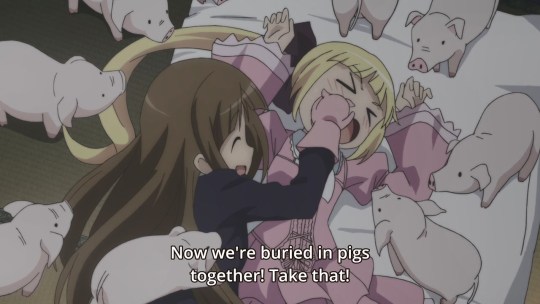

Grimoire of Zero
weaknesses - Grimoire of Zero is a pretty conventional high fantasy on the surface, and if there’s one major flaw it’s how the magical action scenes tend to read like a novel, with lots of flashy lights and words but not much actually happening.
strengths - It handles an incredibly precarious fantasy world filled with dangerously heavy topics like witch burning, slavery, complex magical rulesets, mass murder, sanctioned killings, and political tensions with aplomb in a remarkably natural way. It also has character relationships that are just as natural and incredibly endearing that serve to balance learning about the brutality of the fantasy world, but manages to never feel out of place. Although Grimoire of Zero is certainly conventional, its incredible tact with extreme topics and naturalistic writing are rare qualities for the genre anime fans are probably the most tired of.
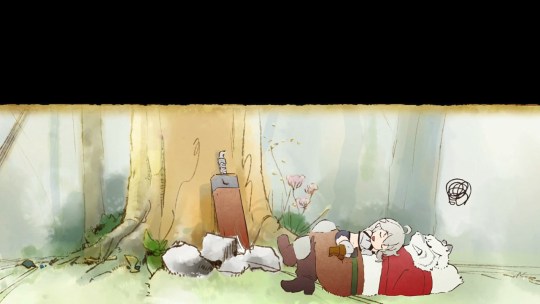

Tsuki ga Kirei
weaknesses - It’s a very conventional school life heterosexual romance, and although it’s a modern take, it still has those limitations. It uses a lot of 3DCG for crowd shots that tends to stand out when you notice it, but that’s a rising trend that we’ll get more used to over time until we’ll hardly notice it at all. Maybe.
strengths - Tsuki ga Kirei is particularly strong at making conventional romance tropes interesting through a modern lens of smartphones in a way that keeps the show fresh and relevant. Contrasting to the crowd shots, it features extremely detailed and personal character animation where it counts, seemingly animated on the ones at times. It’s very good at what it does, plus the gag clips at the end of each episode about the side characters are really funny and good for relieving drama.
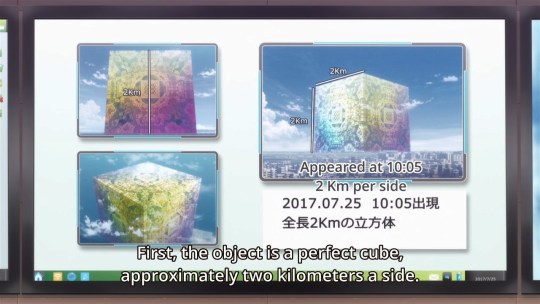
Seikaisuru Kado: The Right Answer
weaknesses - Kado uses an ambitious style of 3D/2D animation that’s kind of distracting, and it can’t seem to decide if it’s going for the tone of a slow-paced live action drama or a traditional anime style, and kind of mixes both. Plot-wise, its resolutions to world-changing problems are a bit too simple and notably Japan-centric.
strengths - Kado showcases a fascinatingly hard sci-fi and sociopolitical thriller without the mandatory robots or war you’d expect, and provides the kind of story that you would never normally see in anime. It’s designed to be way up the alley of theoretical physics nerds and succeeds at that with its gigantic space cube. Toei has touched on an interesting well with the themes of negotiation and dilemmas and has chosen an ambitious and unique style to explore them in.
CUBE
ORB
ORB FROM CUBE

Unfortunately, some of the shows I had early hopes for haven’t delivered, and some of them belong in the Poo Poo Garbage:
Atom: The Beginning
strengths - Atom (prequel to Mighty Atom aka Astro Boy) has an Amazingly animated OP sequence, straight up one of the best segments of animation I've seen all year. It also features intricately designed robots and creative mechanical movement that has been fun to watch.
weakness - The humans are very boring, static, and ugly, and are a majority of the show’s runtime. There’s a serious lack of enthusiasm with anything that involves things that aren’t robots and it sucks all the life out of the show, ironically.
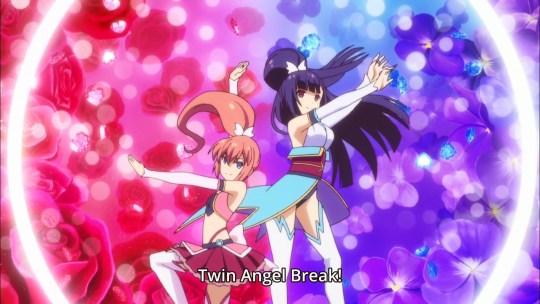
Twin Angel BREAK
strengths - The magical girl transformations and OP look good, and it's funny in a broad sense that it was made and continues to exist.
weaknesses - There’s almost nothing notable about Twin Angel BREAK (Twin Angels BREAK) at all, its comedy consists of extremely obtuse jokes that don't work, and it’s even significantly less interesting than the adult-oriented slot machine version that has heavy fanservice because this one doesn't even have that appeal. It also loses the sole strength of the Twin Angel series by having laughably terrible fight choreography that rarely looks passable. I expected Twin Angel BREAK to be either amazing or entertainingly bad and it has done neither. Twin Angel BREAK has no weaknesses its good actually


Hinako Note
strengths - Hinako Note is generally pretty funny for a moe girls in a club show, and features endcards that reference famous movies and stories that are cute and good.
weaknesses - It does not stay funny, in fact the jokes run dry very quickly. There’s a distinct gap between portraying the same characters as hyper-sexualized and chibi multiple times in the same scene that is extremely disconcerting and inconsistent. On top of that, the fanservice that is there is horrendously inappropriate in all senses of the word, sexualizing characters that are FAR too young even for the nearly nonexistent standards of moe anime, and even when the girls aren’t disturbingly young it always feels really out of place every single time they go for it. This extends to some of the endcards, which are usually cute and clever but occasionally fetishistic and gross. I’ve never seen an anime’s tiny, insignificant problems fester into absolute dealbreakers as quickly as Hinako Note managed to.
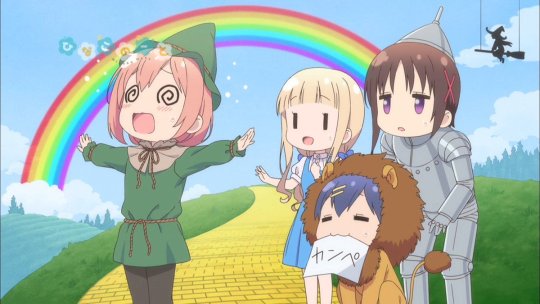
Overall, this season seems to be as strong on average as any other season, but lacks the punch of the seasons we’ve had lately, with crazy projects like Flip Flappers, Yuri on Ice, Rakugo Shinjuu, Scum’s Wish, and even Kemono Friends. Kado seems to be ambitious, but possibly in the wrong direction, and everything else that’s good tends to build off of established conventions. We might have been spoiled with unconventionally successful anime from the last year, and it certainly doesn’t mean this season is bad, but it’s looking like the original anime of Spring 2017 will be overshadowed by the gamechangers we’ve enjoyed recently, and the concurrent sequels to anime everyone already knows are good.
-magical girl liker qb @queuebae
1 note
·
View note
Text
Exploring the Transforming Definition of Mahou Shoujo: Questionably Magical Idols
Magical girl idol reboots are a trend now for some unfathomable reason, and the reception this wave has had is kind of strange. There's a perception that magical girl anime are nearly dead except for Toei’s indomitable flagship Pretty Cure, but at the same time there's been a revival nearly every season of some variation of a magical girl idol series. We saw this last year with Show by Rock #, Nurse Witch Komugi-chan R, and Macross Delta; next year promises reboots of Symphogear, Kaito Tenshi Twin Angel, and Pripara. Except for Komugi-chan R and Twin Angel, none of these are what we think of as traditional magical girl anime, but on the other hand magical girls and idols have been inextricably tied together ever since idol anime started in the 80's, with magical girl series Creamy Mami and Pastel Yumi. Even today, these genres are linked, for better and worse. Kaito Tenshi Twin Angel (lit. Phantom Thief Angels Twin Angel) is a generally awful shonen ecchi anime about magical girls who are barely idols, and Pripara is a bizarre reboot for kids of the already kind of out there idol arcade game/anime franchise Pretty Rhythm. Both of these are getting rebooted next season and they can both be loosely described as idol magical girl anime.
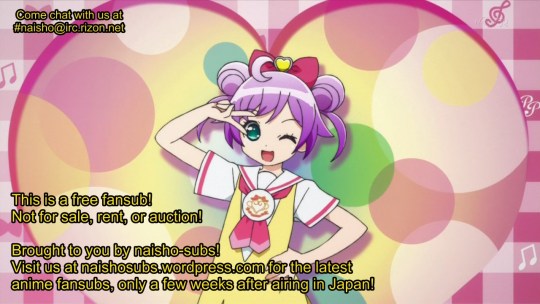
Kaito Tenshi Twin Angel is a pretty unremarkable magical girl series that's a spinoff of a pachislot machine and frankly isn't worth anyone's time. The original anime adaptation was a two-episode OVA back in 2008 and that's where the franchise peaked. Twin Angel was actually sort of creative back then, and balanced magical fantasy with realistic elements, like magical girls being shot at with assault rifles during an illegal drug bust, a main character actually being hospitalized from her injuries, and a memorable villain who was legit terrifying at times. Topped off with arguably catchy pop songs, some really creative animation sequences, and a more mature tone, it was a solid example of a mid-tier magical girl anime. But then they kept making it.

The only reason I brought up this nothing series is because it's an example of a magical girl idol anime, only the idol part is almost never mentioned outside of the OP. It makes the viewer question why bother to include that detail at all, and I think the answer is it's just another bullet point on the magical girl for older males genre formula. It literally doesn't matter if they don't commit to it at all, but you still gotta have idols. At least Nurse Witch Komugi integrated it as a joke, sort of. Nowadays these kinds of anime just release idol-esque albums regardless so it'll be interesting to see if the director drops the idol part entirely for Twin Angel Break so he can spend more time on their awful costumes that somehow get worse every time I look at them. Who thought shoulder pads were a good idea? By definition Twin Angel is an idol anime, but it has no creative investment in that aspect in any way. Not every magical girl idol anime is that lazy, however.
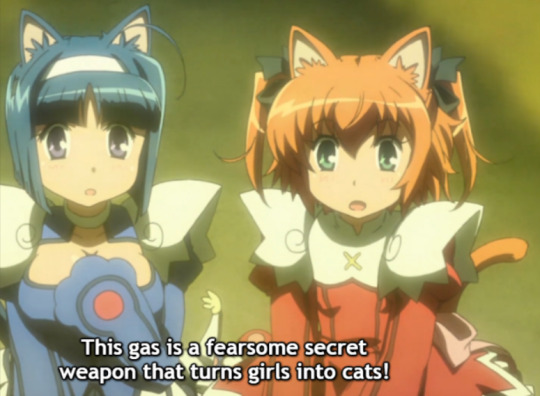
Pripara is like some kind of VR Club Penguin only instead of penguins everyone is idols. The specifics are weird alternate reality dimensional nonsense but at Pripara's core it's a world where anyone at all can be an idol. Girls perform for each other and it's televised and streamed and the system is maintained by identical people in glasses and it's existed for 2222 years and was started by ancient Egyptians and you can't think about it too hard because that way lies madness.

Pripara's best quality is how it focuses on having unusual characters that stand out more than any other idol anime, which all lack variety in comparison to Pripara’s sheer multitude of interesting people. In Pripara, anyone and everyone can be an idol for any reason, from grade schoolers to mothers and grandmas, from a tone deaf vocaloid created from depression to girls with alternative body types that would be sidelined in a more generic idol show, there are absolutely no limits on who deserves to be in the spotlight. Idols in Pripara are raised by lions or are best friends with goats, or express themselves by performing elaborate satanic rituals or dressing like an enormous jellyfish. Even though Pripara is a haven for girls, it's acceptable that a member of the main cast is actually a boy; as long as everyone's cool with it, there's no problem. Pripara expands on the original's already broad interpretation of idol performance straight to infinity, with routines by Cosmic Mom idols, idols that only show up on Halloween, Feral idols that speak human as a second language, whatever you call that clown seizure the art teacher Ajimi does on stage, a full recreation of Shin Godzilla, or even an elaborate Pro Wrestling cage match where an idol beats up a Kraken with her bare hands. Pripara's relentless train of creative gimmicks puts any cast of idols that are merely human girls at a school to shame. Pripara is the flamboyant result of producing an idol anime without limits and it is definitely quite a spectacle.

Pripara embraces the most basic theme of magical girls, the idea of self-transformation. The clumsy and short main character Laala grows a full 2 feet when she enters Pripara, the standoffish and strict disciplinarian Mirei plays the character of a friendly and cheerful blonde, even timid newcomer Chiri becomes outrageously rude when she enters Pripara, to even her own embarrassment. Exploration of identity is just as important to Pripara as any given magical girl anime, maybe even more than usual. Characters struggle with their gender identity, wonder where they belong, and challenge preconceived notions of what they should be. Compared to how Twin Angel treats idols as a footnote, Pripara's magical girl integration is so ingrained that removing it would destroy everything the show stands for. At its core Pripara is about transformation upgrades and flashy performances, but also about balancing your life on and off the ‘stage’. These are qualities shared by almost every good magical girl anime since the 80's, and Pripara is one of the most positive and surprisingly inclusive iterations of those classic themes. Details on the upcoming reboot are slim, but it's virtually certain that Idol Time Pripara will do things that no idol anime has done before.

While it's true that traditional magical girl anime productions have slowed in recent years, magical girl-inspired and cross-genre magical girl anime continue to exist. Idol anime also show no signs of stopping, so as long as that connection stays as essential to Pripara, or as genre mandatory as Twin Angel, there's no reason why magical girls and idols won't continue to be as intertwined as they have always been.
- Magical Girl Consultant qb @queuebae
#magical girls#pripara#vanillablessing#twinangel#twin angel break#pretty rhythm#idol anime#gaarmageddon is the greatest#bite me garuru#idol time pripara
43 notes
·
View notes
Text
qb’s early Spring 2017 pick - Alice to Zouroku

Alice to Zouroku is the story of a psychic girl named Sana who escapes a research lab and shacks up with an elderly florist who admonishes her for misusing her reality-altering powers which are fueled by burgers. If you had to give it a genre it would probably be called magical girl, and I think it’s had one of the strongest openings of the season.

Alice really shines when it showcases Sana's enthusiasm and curiosity, where we see her learn about the world outside of the sterilized laboratory she spent most of her life in. It's adorable to watch Sana experience pancakes for the first time, or get excited from seeing a cool bird, or accidentally summon a swarm of pigs. The second episode had none of the pseudomagical battles from the extended season premiere, but was delightful anyway because they invested time into showing Sana interacting with the outside world, which seems to be more in line with the tone this anime as a whole is going for.

What a lot of action-oriented magical girl anime get wrong is that they only have a perfunctory daily life between their magical battles. Alice to Zouroku goes the extra mile and balances both major aspects of magical girl anime by taking the time to really establish what they are fighting for, and not just stringing together action scenes or doing the bare minimum to get through the motions of a story. I was initially worried after the double-length first episode that was mostly exposition, but Alice to Zouroku may be my favorite show of the season so far.


#alice to zouroku#magical girl#magical girl anime#spring 2017 anime#vanillablessing#actuallyitstwinangelbreak
4 notes
·
View notes
Text
A Spoiler-Free Discussion of Megalobox, Ashita no Joe (Tomorrow's Joe), and Spoiler Culture

Joe, celebrating his 50th birthday, where nobody showed up
qb: Anime fans have braved maniacal streaming services, director meltdowns, and talking animal mascots to enjoy their chosen medium of entertainment, but one word strikes fear into even the most hardened aficionado; spoilers. In recent weeks, one such iconic Japanimation has come under fire, Tomorrow’s Joe (Ashita no Joe), during the airing and growing popularity of a 50-year offset spiritual sequel to Joe, Megalobox. The internet response to Megalobox has been great and terrible, like Voldemort, and also like Voldemort nobody wants to say the most identifying feature of Joe for fear of retribution. Joe has had a venerable and ubiquitous role in shaping the last 50 years of Japanese manga and anime, and its most iconic page is nearly impossible not to recognize. However, despite being referenced, parodied, and discussed outright in countless anime, it is still relatively unknown in the English-speaking market, due probably to what can charitably be called an incomplete official release. This has resulted in a strange situation where the most iconic moment of a series is commonly known, but the context for it is not. Can the internet’s livetweeting culture really keep a lid on details for something that might be a spoiler, but has been in the zeitgeist for over 50 years?
Chorps: Legitimately, I hadn’t even made the connection that the picture was from Ashita no Joe until you brought this up. It’s so recognizable and nebulous that it’s basically transcended context. And I think that’s sort of what’s happened here with Megalobox. The anime community as a whole technically knows what’s going to happen in this re-imagining of Ashita no Joe thanks to 50 years of cultural osmosis, but the connection wasn’t made in people’s minds until someone pointed it out. It’s not like Megalobox has been particularly subtle about its themes regarding its dead end state.

Joe enjoying The Emoji Movie, after an operation where he received two prosthetic arms, due to punching so hard they flew off
qb: I definitely know what you mean about Megalobox's gallows theme being about as subtle as the original Joe, but without spoiling anything, in my opinion Megalobox has from the very start been more clearly about the division between classes, in numerous extremely tangible ways. Avoiding being specific, Joe and Junk Dog are clearly distinct from one another in important ways. Joe's obsession with pushing his body as far as it will go, for nobody's sake but his own, means that his fate is largely self-driven. By contrast, Junk Dog's path seems to be more affected by outside forces, where he fights against society and is also supported by people to achieve his dream in an outward way that Joe, who to put it lightly has no friends, never did. Although both "Joes" start with nothing but their pride, in my eyes their fate manifests in different ways which would make the result of their final episodes have a totally different meaning. Even if the spiritual sequel does end the same way, they won't necessarily have the same conclusion. As more is revealed in Megalobox's story, do you think the attitude towards spoilers has relaxed at all from when Megalobox's first trailer dropped, or has it gotten even more extreme as it races towards the inevitable?
Chorps: I could only imagine it getting less relaxed, since the content of the show is much more nebulous before release. Especially with the last couple episodes, I think the conclusion has now been planted in such a way that the more people are reminded of the source material, the more they’ll be going into the finale with certain expectations. In some ways, that may be good, since it adds a sort of tension to whether or not Megalobox is really going to follow in Joe’s footsteps, but that particular mood of dread might not be the best way to watch the show. And I think part of this disconnect is that no one wants to accept Junk Dog’s fate. Like you said, the story trajectory may be the same, but the themes and circumstances between Joe and Junk Dog give us very different reads on our main characters. Junk Dog is someone you want to root for, and the story focuses so much on his struggle for recognition and respect in the sport that the viewer is basically legally obligated to root for him. Being reminded that this is Ashita no Joe Again forces them to accept a conclusion that they don’t want to confront. And that’s where the backlash comes from; it’s tainted their perception of Megalobox’s trajectory, even as the show continues to push towards this conclusion.

Joe, in his guest appearance on a Very Special Episode of Magical DoReMi about violence
qb: This kind of spoiler-free restriction gets more and more difficult to maintain the deeper we go, so I’m going to try to wrap things up here. I understand what you mean by the connections to Tomorrow’s Joe increasing, and the contrasts in these aspects speak louder than the similarities. While Joe’s fatalistic tendencies were largely internal and self-inflicted, Junk Dog’s growing source of doom throughout the series is distinctly an external force that twists everything he and his coach have achieved. While Junk Dog’s obsession with earning the legitimacy of everyone else is his core motivation, Joe’s fame was accumulated as an afterthought; although he’s an unexpected inspiration to others, the only thing he truly wants is from himself. The chains that hold back Junk Dog are tangible to an absolutely ridiculous degree, but the setting of a post-war, reconstructing Japan that Joe grows up in is much harder to quantify. The mechanisms being so different in Megalobox compared to Tomorrow’s Joe mirrors the need to be distinct at all costs. It needs to be the real deal, not just another Joe. But unfortunately, this kind of discussion is tough to have in broad strokes, so casual discourse will usually end up devolving into spoiler territory. Personally, I think it doesn’t matter how Megalobox ends next week, because it’s already earned its spot in the big leagues.
Chorps: This show is not your average JOE.
@chorpsaway and @queuebae on twitter
Megalobox and some of Tomorrow’s Joe are on Crunchyroll, but under the name Champion Joe 2 which was the only part ever licensed.
6 notes
·
View notes